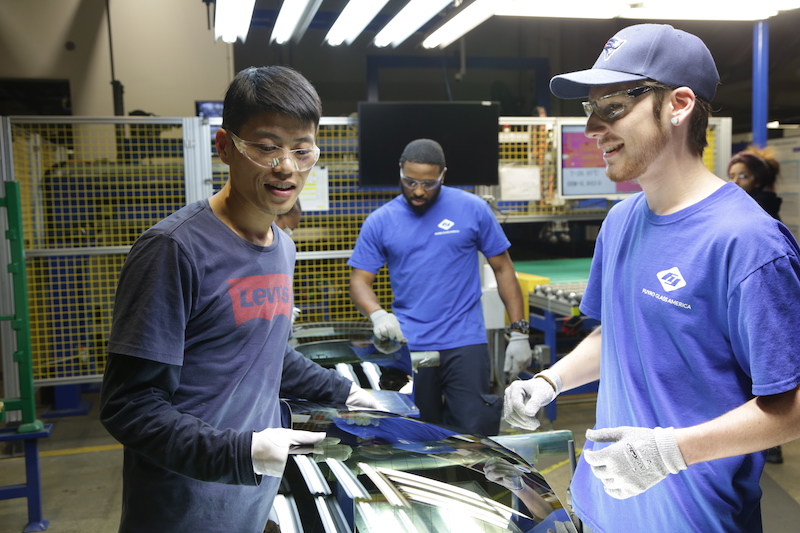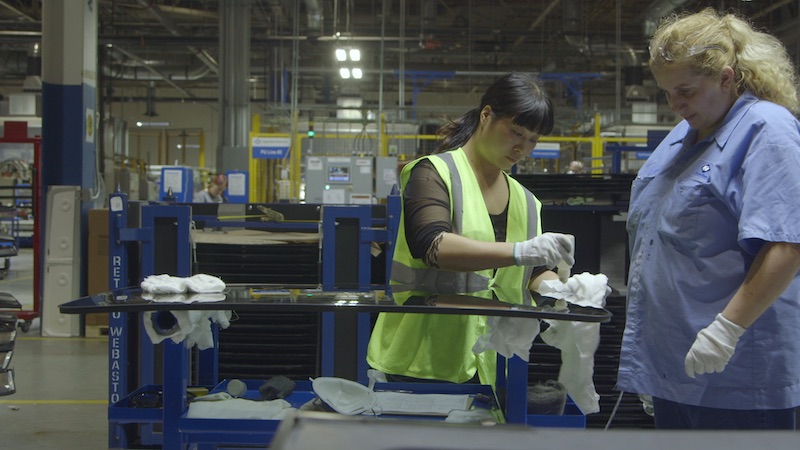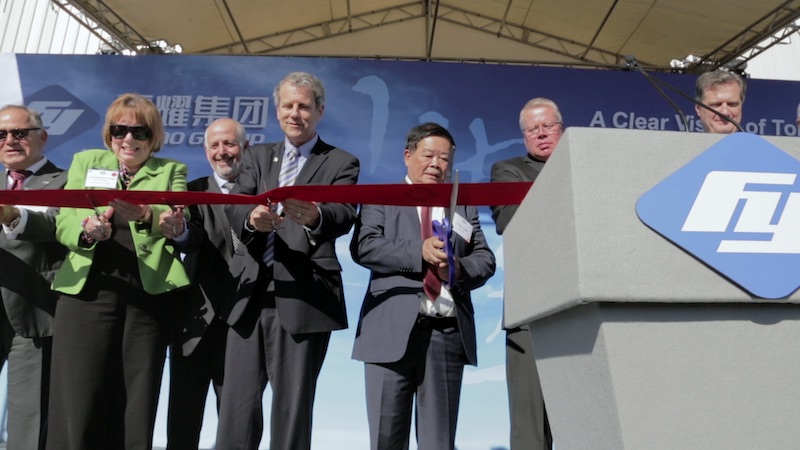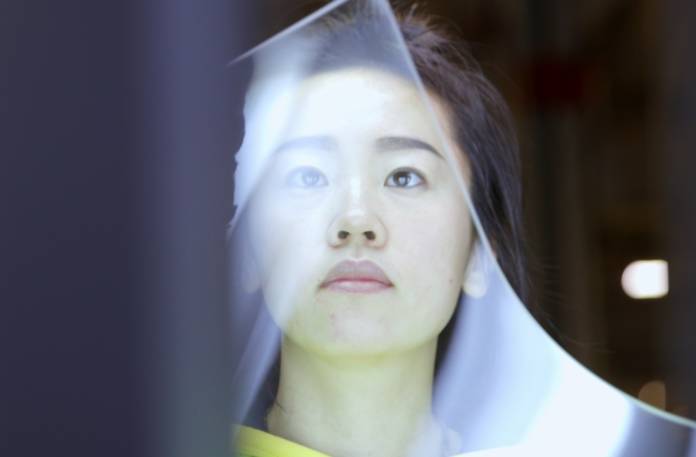As the United States grows more urbanized and service-oriented—not to mention politically polarized—the image of the blue collar factory worker becomes more remote to many, something of a composite character from a song by Bruce Springsteen or John Mellencamp. The Rust Belt is more a mental landscape of ruin porn and abandoned dreams than a thriving nexus of American innovation and labor.
But American Factory (out August 21 on Netflix)—the latest eye-opening docudrama from acclaimed producer-directors Julia Reichert and Steven Bognar (The Last Truck: Closing of a GM Plant, A Lion in the House, Seeing Red)—about the closing and reopening of a factory outside of Dayton, OH, really brings blue collar workers back into focus and reminds us why paying attention to their existence and transformation is crucial.
Reichert and Bognar had previously lived in Dayton for decades, so they bring a unique sensitivity and understanding to the hardships that these factory workers face. They start their film poignantly, with the announcement on December 23, 2008, that the General Motors Plant in Moraine, OH, is closing. If this closure was ignored by most Americans, it certainly wasn’t by the thousands of longtime employees left without any source of income.
Just one year into the Great Recession, jobs were hard to recoup, particularly in an area already in an economic decline since the shrinking of the area’s once-powerful industrial sector in the early 1980s. Homes were foreclosed upon, vehicles lost, and the American Dream seemed like a lie.
The documentary next picks up in 2016, when the same factory is reopened. Not by GM nor another US manufacturer, but by Fuyao Glass Industry Group, one of the largest auto glass producers in the world, supplying major automobile manufacturers—including Ford, GM, BMW, Honda, and Bentley—with car and truck windows, windshields, and sunroofs. The Chinese company dubs its new American outpost Fuyao Glass America.
Early on, there is an air of excitement as Fuyao, run by Chinese billionaire, Cao Dewang, invests hundreds of millions of dollars into the new factory and creates thousands of jobs for area residents. Shift hours would remain the same as they had been at GM, many employees would be rehired (rounded out by Chinese immigrants), and the company would maintain its American identity.

Dewang, referred to as The Chairman or Chairman Cao by employees, says through his interpreter, on one of his first visits to his premier American outpost: “I love Ohio and I love the place where I invest significantly here in Dayton.”
Company Vice President Dave Burrows mirrors his new boss’s sentiment that the deal is very pro-American. “This is a historic project that is going to help grow this community, give people jobs, and give a future to your kids and my kids,” he says. “The future is bright.”
Many of the Americans, who are used to camaraderie among their peers on the factory floor, desperately cling to the hope that they’re still “all as one.” But the melding of Eastern and Western cultures proves more difficult than anyone anticipated. When Chairman Cao’s unrealistic first months’ profit goals aren’t met and the American employees begin complaining about unfair and unsafe working conditions, the Chinese executives act quickly and fiercely.
The Chairman fires President John Gauthier and VP Dave Burrows and every other American with any power, replacing them with Chinese employees. Lower-level Chinese employees, who were originally encouraged to integrate into liberal American culture are now trained to reject the US and its way of life.
Americans, now referred to as “foreigners,” are regarded as lazy, since they only work eight hours a day with two breaks and get weekends off—in contrast with the Chinese, who work 12-hour shifts and only take one day a week off. American fingers are deemed “too fat” to operate certain machines.
“We need to use our wisdom to guide and help them because we are better than them,” says new Fuyao Glass America president Jeff Liu.

Nationalism and xenophobia are sweeping the company from the top down. The Chairman reminds Chinese employees that they come from Chinese mothers and that China, not America, will always be their home. Chinese posters and flags appear everywhere inside the factory, and propaganda videos of Chinese children singing and praying fill the breakroom where American employees eat.
Reichert and Bognar’s candid interviews with the American employees inside and outside the workplace help to personalize their painful new reality, as they’re expected to work twice as hard for half their previous pay at GM.
Bobby, a furnace offloader, can’t work up to Fuyao’s standards and ends up at home with a workplace injury. Shawnea, a glass inspector, can no longer provide for her family in the same way. Rob, a furnace supervisor, is terminated for taking two to three minutes to pull up a report. Jill, a forklift operator, desperately battling her way back to middle class after losing everything, is now fighting for better working conditions.
Soon 11 safety complaints are filed against Fuyao Glass America. Still others claim employees are receiving unfair treatment by their Chinese supervisors.
Tempting as it may be, the documentarians are careful not to crucify the Chinese employees. It devotes as much time and understanding to them as they do to their American colleagues. Most of the Chinese immigrants, for example, are not only working for low wages themselves, but are also dealing with the added pressures of moving to an unfamiliar country far from their families and hardly speaking any English.
Wong, a furnace engineer for over 20 years, with multiple burns on his arms to prove it, is particularly tender toward the Americans. Surviving on a two-Twinkie-a-day lunch, he says he misses his life back in China with his family and admits to crying when no one else is around. He also complains that his people have become too greedy. Quickly making friends with his American colleagues, whom he begins to regard as “brothers,” he has a harder time chastising them.
“I think the most important thing is mutual understanding,” he says later, after realizing how hard Americans work, some of them two to three jobs just to make ends meet on their reduced salaries. “I always thought Americans lived a comfortable and superior life. I thought they didn’t have to make sacrifices.”
Even Chairman Cao is given an opportunity to redeem himself, on a visit to a temple back in his Fuqing, Fujian province in China. Between shots of him praying, he wistfully reminisces about the poor and undeveloped pastoral China of his youth. He also admits to being happier living among the croaking frogs, chirping bugs, and blooming flowers.
“Now I live in a new era of prosperity and modernity but I have a sense of loss,” he says. “Have I taken the peace away and destroyed the environment? I don’t know if I’m a contributor or a sinner.”
But any chance of finding common ground between the Chinese and Americans is quashed when the United Automobile Workers (UAW) union begins to push for the company to unionize. To Chairman Cao, the union is a dark, subversive force that will decrease the company’s efficiency, but to the disempowered Americans, it’s their only way to regain their lost voices.
The Chairman is not interested in hearing them, but he’s all ears when a hired band performs a song about lean manufacturing at one of his corporate events. His dream of achieving maximum output using minimum employees is finally in reach as he begins cutting workers and replacing them with robotic arms in the name of speed and efficiency.
With The Chairman’s initiatives in place, Fuyao Glass America finally starts to show a profit. But the documentary—the first of seven projects from the former president and first lady Barack and Michelle Obama’s new production company, Higher Ground—seems to ask, “At what cost?” That’s left to audiences to answer for themselves.

The filmmakers and the Obamas have stressed that they want to stay out of politics with the documentary, simply showing things as they are without taking sides.
That’s why the elephant in the room during the making of the film, Trump’s campaign for president, is noticeably pushed out, except when State Sen. Sherrod Brown complains that both of the 2016 US presidential candidates disparagingly refer to the manufacturing heartland as the “Rust Belt,” and Fuyao Glass America president Jeff Liu tells employees, “Let’s make American great again.”
But that doesn’t mean that the film is without political undertones. Audiences might remember that Trump won the 2016 presidential election largely because he carried states like Ohio by falsely promising to put factory workers, like the ones in the film, back to work. Also, it’s impossible to watch this documentary without contemplating how the ramifications of the US’s rivalry with China over the last two decades and Trump’s ongoing tariffs against China will impact Fuyao’s future operations.
The filmmakers understand that the greatest problem raised in American Factory can’t be solved by a divided nation or international trade wars. So they leave viewers with a message of unity, recommending that America and China and Democrats and Republicans all band together to battle what they call one of the biggest employment crises of the 21st century—automation—expected to impact over 375 million people globally.
AMERICAN FACTORY
Premieres Wed/21
Netflix
More info here.






